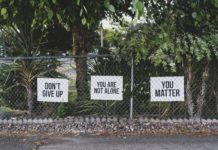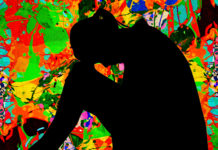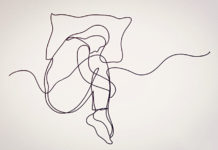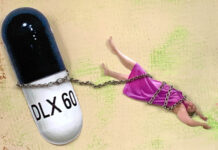Out of the Abyss (with a Little Help from My Friends)
An ER doctor told me I was experiencing venlafaxine withdrawal, then told me to go home and take care of myself. Unbeknownst to me, I was about to enter pure hell.
Out of my Mind. Driven to Drink.
This is an article written by a woman named Anne-Marie. I am publishing it here because it epitomizes what RxISK.org, a company I have founded, is all about. It tells of one woman extraordinarily getting to grips with a problem she has on treatment. My hope is that when RxISK.org is up and running we will be able to make it easier for people like Anne-Marie to engage with their doctors to solve problems like this.
Ambushed by Antidepressant Withdrawal: The Escape Story
I’m alive. More than 30,000 veterans in the past decade alone are not. I was not warned of the risks of this drug. I was not told that once on it, I might never be able to get off it, or the nightmare that would ensue when I tried. I know millions of others were not told either.
Up in the Air: Surviving 24 Hours with Akathisia
Flying from Anchorage to Cleveland while suffering from life-threatening akathisia was going to be a constant push-pull between the urge to freak out and maintaining my body and psyche so as not to scare the other passengers.
My Story and My Fight Against Antidepressants, Part II
Healing mental health issues through correct supplements as well as nutrition is, I believe, the final factor for me in my journey. This is possibly what was missing in my first attempt at coming off, and why my brain and body couldn’t handle the extreme anxiety I felt in December 2013. I am ensuring that as I prepare to taper off the Lexapro in 2015, my brain and body are being supported in every way possible.
Disinhibited
The party would continue for a time, but an inevitable crash ensued. I left my family, was fired from my job for uncontrollably screaming at my boss, and gambled away whatever money I had left in the stock market. A debilitating depression soon began, of a magnitude I could not previously have imagined. I had lost everyone and everything in my life.
One Gutsy Woman
The childhood and psychiatric abuse altered my neurological, hormonal and other bodily functions and it was difficult to say which abuse left what mark. The doctors used medication to fix the changes and the taking of prescription pills became a habit. I took pills to calm me, pills to sleep, and pills to make me happy. A few months after stopping all medications, I was a bundle of nerves and I opened the cupboard for a pill. Living on autopilot as I had been doing for so long had to stop. I switched gears from absentmindedly resorting to pills, to purposefully calming myself without using drugs by breathing the way the psychologist had taught me.
Falling Through the Cracks
I am an award-winning singer/songwriter with a number one record to my credit. I also owned several small businesses and founded a 501c3 non-profit for women's health. I ate healthy, swam and cycled every day and had a very active lifestyle. This was before benzos came into my life.
If I Had Remained Med Compliant…
If I had remained med compliant I wouldn’t understand the simple joys of caring about my hygiene and my surroundings. I’ve wanted to write about this for a long time but I’ve not done it and I think it’s because I still have shame around how slovenly I became. I hid it from others fairly well most of the time, but I couldn’t hide it from myself. The fact is the drugs stripped me of some very basic elements of human care. When one doesn’t care about their immediate environment and their bodies, they really just don’t care about themselves. It’s a very painful place to be and yet when it’s caused by drugs it’s all muted and weird and not really who we are at all and so really all that is left is horrible shame.
My Story and My Fight Against Antidepressants
I’d like to share a bit about what happened to me after being placed on these medications, and how I successfully got off. Until recently, I was embarrassed to talk about my personal experiences publicly, as I’m a professional who specializes in anxiety and depression. Today, medication free, I feel better than ever before, and I am now on a mission to help my current clients get off medications, and to inform others through my writing about the dangers and pitfalls of starting antidepressants.
For the Record
Here and now, I am Ativan-free and slowly tapering off Wellbutrin after 25+ years. Unable to work due to the severity of iatrogenic injury, I sometimes think of myself as a healing journeywoman. When the terrain is especially rough, I reflect on the words: "The best revenge is living a happy, healthy life." When circumstances and symptoms permit, I’m doing just that.
From Surviving to Thriving: Unleashing Creativity
There were days that I’d wake up and all I could do was cry for no particular reason, just another miserable day of withdrawal. However, the idea of taking photos would get me out of the house. Especially on those days, the absolutely only thing that would get me to move at all was the idea of taking photos. One particular day, I was just crying, crying, crying, and as soon as I got to a beautiful spot that I loved, I stopped crying, took photos, and felt at peace. I even found that the days I felt the worst were the days I took the best photos.
Lingering Side Effects of Quitting Antidepressants
Nobody told me what it would be like when I first stopped taking antidepressants. The worst is definitely over, but I’m still experiencing some lingering side effects. When the hyper-arousal to sights and sounds kicks in and my head starts buzzing, I’ve learned some ways to cope.
A Caregiver’s Story- And How I Became an Addict
In 1994, my nineteen-year old daughter, Cristina, was diagnosed with chronic myelogenous leukemia (CML). It was a diagnosis that came totally out of the blue and as a complete shock. Soon after she was diagnosed, it became clear that I wasn’t going to be able to sleep because of the tremendous stress, so I asked the very kind doctor who diagnosed Cristina if he could give me a prescription for something that would help me sleep. He agreed, and so began my “relationship” with Xanax. I had never taken anything like that before and didn’t know anything about it. All I knew was that as my daughter’s primary caregiver, I needed sleep in order to fight to keep her alive.
Why Don’t They Know? A Letter to My Doctor
I am writing this letter, after much consideration, in the depths of benzodiazepine withdrawal. I need to be a voice in the midst of silence; I need to be heard before you write one more prescription for a benzo or any other mind-altering drug for that matter. It is my hope in writing this that you begin to ask questions as you sit across from your patients: why are they depressed, anxious, insecure, fatigued, paranoid, agoraphobic? Are the drugs I so readily prescribe contributing to their declining physical, mental and emotional health? Are these drugs really the answer? What are they really doing to the brain?
What Happened When I Went Off Meds and Onto Nutrients
I remember clearly thinking, “I’m done. I’m not putting myself through this again.” I wasn’t going to settle for the side effects of a marginally better than placebo treatment again. Here is a brief look into my rollercoaster journey of recovery, returning to work, having my trauma re-triggered, finding a way through, and finally living well.
On the Other Side
It was the first time in my Klonopin journey it occurred to me the problem might not be inherent in me. The problem might actually be the Klonopin. Convinced my very life was at stake, I made the firm decision to get off the stuff once and for all.
The Breaking Point
How did I become someone who could barely function? I was a high-performing sales executive ranked in the top 2% of an international business communications company. But now, after using powerful psych meds for depression and anxiety for more than a decade, I couldn’t do basic things like go to the grocery store, plan a meal, make dinner, or get together with friends.
After Seroquel
The topic of this article is Seroquel withdrawal: the process of withdrawal and the consequences of having taken this particular chemical for over ten...
Akathisia After a Five-Year Taper: Chained to an Antidepressant Forever
I have been on Cymbalta for 17 years now and am gutted that my five-year taper did not free me of the drug.
The Many Battles of a Benzo Injury: Jean’s Story
Jean was never warned about Librium's potential to cause physical dependence or the subsequent withdrawal effects that can result from its long-term use, nor was she counseled on an exit plan. So when she decided to taper off the drug, her withdrawal symptoms were so severe that her life and health quickly spiraled out of control.
Calm, Organized, Homicidal Behaviour – My Connection to School Shooters
There is little doubt in my mind that many school shooters were in an antidepressant-induced state of psychosis, which is a loss of contact with reality that makes it difficult to distinguish between what is real and what is not real. That's what happened to me. I started taking 60mg of Paxil a day. Three days later, I planned my suicide. Then I planned a murder.
The Prescription that Changed My Life
What I have learned is that benzos don’t discriminate. They don’t care that you have a master’s degree or that you are a good person in the community or that you were just doing what the doctors told you to do and you were woefully ignorant and misinformed of their dangers.
Once Upon a Time in Withdrawal
I’ve seen people put more research into how to cook a turkey at Christmas time than previous psychiatrists did for my health. From the DSM to the prescription pad, if it wasn’t there, it didn’t exist. It’s a very cut-and-dry, mix-and-match method to modern medicine that has harmed millions of people, and it nearly killed me.
Me & The Meds: The Story of a Dysfunctional Relationship
Those of us who question psychiatry’s relationship with medication may be be dismissed as ‘Pill Shamers’ or branded as irresponsible and dangerous voices by those who are convinced medication is the only way of treating someone’s ‘illness’. The debate can feel like a fight between two intractably opposed sides, giving the impression that we must either be ‘for’ or ‘against’ medication. Unfortunately the information and space needed to explore our complex relationship with medication – as practitioners and people – is in short supply, making the concept of informed choice a bad joke. Over the next two years, we will bring together a book made of contributions from people who have successfully taken control of their use of medication.
























